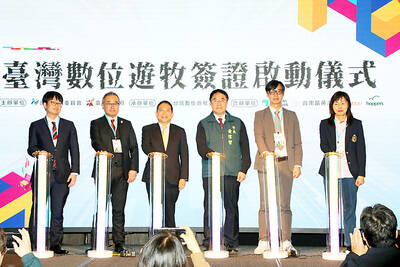British energy giant BP and US-based ConocoPhillips announced plans on Monday to build one of the world’s largest natural gas pipelines from Alaska to Canada.
The companies said the proposed pipeline would be more than 1,126km long and stretch from a gas treatment plant on Alaska’s North Slope into Canada through the Yukon Territory and British Columbia to Alberta.
The planned Alaska Gas Pipeline — called Denali — would be able to ship 113 million cubic meters of natural gas per day to markets.
The two energy groups said it would also be the “largest private sector construction project ever built in North America.”
The two firms said they would spend US$600 million on the project before 2010, after which they would need to gain approval from the US Federal Energy Regulatory Commission and Canada’s National Energy Board before they can start construction.
“This project is vital for North American energy consumers and for the future of the Alaska oil and gas industry. It will allow us to keep our North Slope fields in production for another 50 years,” BP chief executive Tony Hayward said.
“The Alaska Gas Pipeline project will deliver natural gas to meet North America’s growing energy needs,” ConocoPhillips chairman and CEO Jim Mulva said.

ANNOUNCEMENT: People who do not comply with the ban after a spoken warning would be reported to the police, the airport company said on Friday Taoyuan International Airport Corp on Friday announced that riding on vehicles, including scooter-suitcases (also known as “scootcases”), bicycles, scooters and skateboards, is prohibited in the airport’s terminals. Those using such vehicles should manually pull them or place them on luggage trolleys, the company said in a Facebook post. The ban intends to maintain order and protect travelers’ safety, as the airport often sees large crowds of people, it said, adding that it has stepped up publicity for the regulation, and those who do not comply after a spoken warning would be reported to the police. The company yesterday said that

NEW YEAR’S ADDRESS: ‘No matter what threats and challenges Taiwan faces, democracy is the only path,’ William Lai said, urging progress ‘without looking back’ President William Lai (賴清德) yesterday urged parties across the political divide to democratically resolve conflicts that have plagued domestic politics within Taiwan’s constitutional system. In his first New Year’s Day address since becoming president on May 20 last year, Lai touched on several issues, including economic and security challenges, but a key emphasis was on the partisan wrangling that has characterized his first seven months in office. Taiwan has transformed from authoritarianism into today’s democracy and that democracy is the future, Lai said. “No matter what threats and challenges Taiwan faces, democracy is the only path for Taiwan,” he said. “The only choice

QUIET START: Nearly a week after applications opened, agencies did not announce or promote the program, nor did they explain how it differed from other visitor visas Taiwan has launched a six-month “digital nomad visitor visa” program for foreign nationals from its list of visa-exempt countries who meet financial eligibility criteria and provide proof of work contracts. To apply, foreign nationals must either provide proof that they have obtained a digital nomad visa issued by another country or demonstrate earnings based on age brackets, the Bureau of Consular Affairs said. Applicants aged 20 to 29 must show they earned an annual salary of at least US$20,000 or its equivalent in one of the past two years, while those aged 30 or older must provide proof they earned US$40,000 in
TECH CORRIDOR: Technology centers and science parks in the south would be linked, bolstering the AI, semiconductor, biotech, drone, space and smart agriculture industries The Executive Yuan yesterday approved a “Southern Silicon Valley” project to promote the development of an artificial intelligence (AI) and semiconductor industry in Chiayi County, Tainan, Pingtung County and Kaohsiung. The plan would build an integrated “S-shaped semiconductor industry corridor” that links technology centers and science parks in the south, Executive Yuan spokesperson Michelle Lee (李慧芝) said yesterday after a Cabinet meeting. The project would bolster the AI, semiconductor, biotech, drone, space and smart agriculture industries, she said. The proposed tech corridor would be supported by government efforts to furnish computing power, workforce, supply chains and policy measures that encourage application and integration